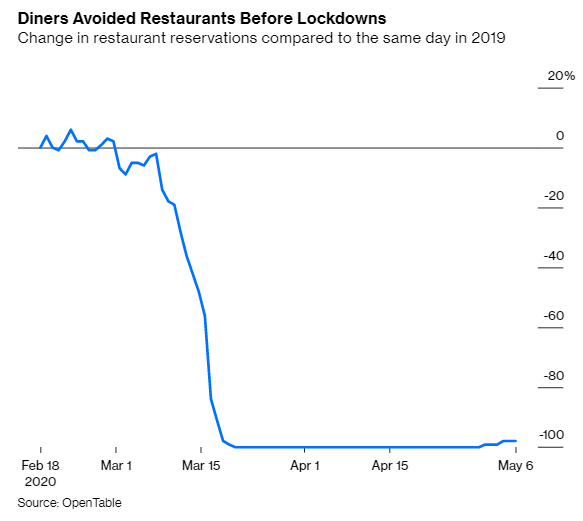1/In today& #39;s @bopinion post, I explain why, contrary to popular belief, lockdowns did NOT cause the economic devastation in the U.S. -- and what this implies for future lockdowns. https://www.bloomberg.com/opinion/articles/2020-06-18/fear-of-coronavirus-infection-hurt-economy-more-than-lockdowns?sref=R8NfLgwS">https://www.bloomberg.com/opinion/a...
2/As cases rise in the South and Southwest, some places are considering going back on lockdown.
Is this a good idea? https://www.bloomberg.com/news/articles/2020-06-11/houston-may-reopen-virus-hospital-at-stadium-as-cases-expand?sref=R8NfLgwS">https://www.bloomberg.com/news/arti...
Is this a good idea? https://www.bloomberg.com/news/articles/2020-06-11/houston-may-reopen-virus-hospital-at-stadium-as-cases-expand?sref=R8NfLgwS">https://www.bloomberg.com/news/arti...
3/It& #39;s pretty clear that lockdowns DO reduce the spread of the virus.
Just take a glance at Sweden, relative to its Nordic neighbors:
Just take a glance at Sweden, relative to its Nordic neighbors:
4/And if you don& #39;t think that& #39;s enough evidence, check out the research that says lockdown reduced the spread of the virus: https://www.medrxiv.org/content/10.1101/2020.04.13.20063628v3">https://www.medrxiv.org/content/1...
5/But what about the economy? Don& #39;t lockdowns come at a huge economic cost?
Well...no. At least, the first wave of lockdowns didn& #39;t.
How do we know that?
Several ways...
Well...no. At least, the first wave of lockdowns didn& #39;t.
How do we know that?
Several ways...
7/Second, we see that credit card spending patterns are basically identical between states that locked down and states that didn& #39;t lock down. https://twitter.com/TheStalwart/status/1268967503314792450">https://twitter.com/TheStalwa...
8/Third, economists have found that the degree of labor market collapse was not related to how strong a lockdown a state did.
https://www.nber.org/papers/w27061 ">https://www.nber.org/papers/w2...
https://www.nber.org/papers/w27061 ">https://www.nber.org/papers/w2...
9/Even in Sweden and Denmark, lockdown vs. no lockdown probably wasn& #39;t a very big economic factor!
https://arxiv.org/pdf/2005.04630.pdf">https://arxiv.org/pdf/2005....
https://arxiv.org/pdf/2005.04630.pdf">https://arxiv.org/pdf/2005....
10/From all this evidence, it& #39;s clear that FEAR OF THE VIRUS, NOT LOCKDOWN, was what hurt state and local economies.
11/So at this point you may be tearing your hair out and screaming: "How can lockdown save lives if it doesn& #39;t also hurt businesses?!!!!"
Well, great question. It might have to do with how the virus gets spread.
Well, great question. It might have to do with how the virus gets spread.
12/There& #39;s a growing scientific consensus that PROLONGED INDOOR CONTACT is what spreads coronavirus.
Meaning that lockdown probably saved lives by making companies have people work from home, and by preventing large indoor gatherings. https://www.wsj.com/articles/how-exactly-do-you-catch-covid-19-there-is-a-growing-consensus-11592317650">https://www.wsj.com/articles/...
Meaning that lockdown probably saved lives by making companies have people work from home, and by preventing large indoor gatherings. https://www.wsj.com/articles/how-exactly-do-you-catch-covid-19-there-is-a-growing-consensus-11592317650">https://www.wsj.com/articles/...
13/Working from home and banning house parties doesn& #39;t hurt the economy much. But it probably does save lives.
This has big implications for future lockdown policy.
It means states and cities can probably get away with "lockdown lite".
What& #39;s "lockdown lite", you ask?...
This has big implications for future lockdown policy.
It means states and cities can probably get away with "lockdown lite".
What& #39;s "lockdown lite", you ask?...
14/"Lockdown lite" would mean something along the lines of:
1. Work from home
2. No indoor gatherings of more than a few people
3. No indoor restaurant/bar seating
4. Mandatory masks for anyone in an indoor public space
1. Work from home
2. No indoor gatherings of more than a few people
3. No indoor restaurant/bar seating
4. Mandatory masks for anyone in an indoor public space
15/AND, of course, lots of #TestAndTrace!!! https://testandtrace.com/the-full-explanation/">https://testandtrace.com/the-full-...
16/States and cities should consider "lockdown lite", combined with robust testing, tracing, and isolation, as a way to inflict minimal harm on the economy while saving the maximum number of lives in the event of a local coronavirus outbreak.
(end) https://www.bloomberg.com/opinion/articles/2020-06-18/fear-of-coronavirus-infection-hurt-economy-more-than-lockdowns?sref=R8NfLgwS">https://www.bloomberg.com/opinion/a...
(end) https://www.bloomberg.com/opinion/articles/2020-06-18/fear-of-coronavirus-infection-hurt-economy-more-than-lockdowns?sref=R8NfLgwS">https://www.bloomberg.com/opinion/a...

 Read on Twitter
Read on Twitter




